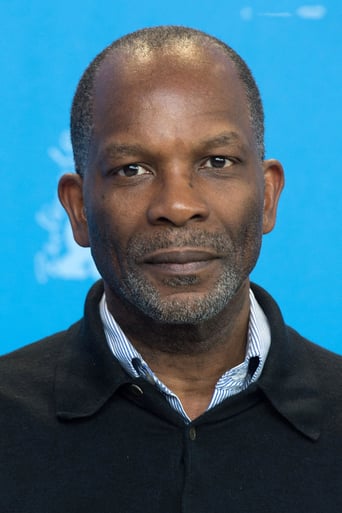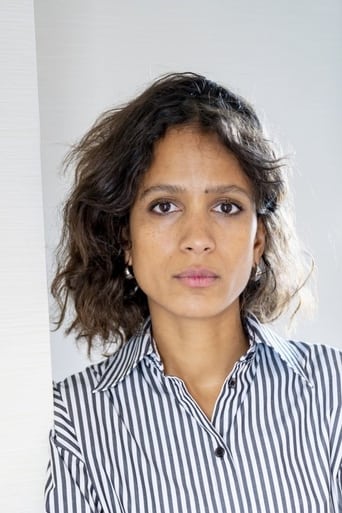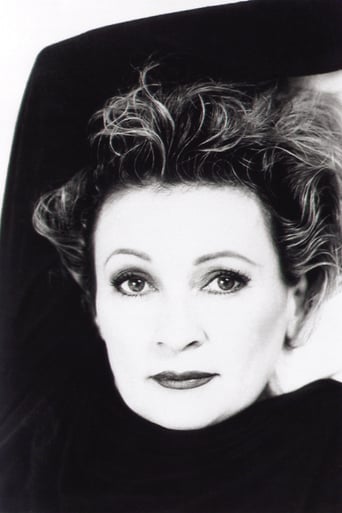Beanbioca
As Good As It Gets
MoPoshy
Absolutely brilliant
Erica Derrick
By the time the dramatic fireworks start popping off, each one feels earned.
Kayden
This is a dark and sometimes deeply uncomfortable drama
tieman64
"35 Shots of Rum" opens on Lionel, a black African immigrant who spends long hours driving a train across France. Haggard and tired he returns to his tiny apartment, which he shares with daughter Josephine. "Don't feel I need looking after," he tells her, but it's a lie. They're lonesome without each another. Director Claire Denis then lingers on scenes of unusually tender father/daughter intimacy, such that for a while we think the duo may be lovers. But their relationship is more complex; they want to be free of each other but are wary of cutting ties.Denis' films have long focused on France's former colonies ("Chocolat", "Beau Travail", "White Material" etc). The political contradictions, psychological pressures and after-effects of this colonial legacy are the targets of "35 Shots of Rum, but aside from one scene, in which Josephine and her classmates debate colonialism, resistance, globalisation and name-drop philosopher Frantz Fanon and economist Joseph Stiglitz, such "big issues" remain in the background. Instead, the film's themes are approached subtly. And so we see first generation immigrants relegated to public sector work, a father and daughter who yearn to move on but feel weighed down by familial, historical and past ties, and characters who are either taxi drivers or train conductors, all things transient, always moving, but going nowhere and unable to move on. A sense of alienation blankets the film, characters trapped in cubicles, cars, carts and carriages, sealed mournfully in the aural cocoons afforded by Ipods, or unable to break free of class and racial straitjackets. Josephine – herself both black-and-white, her mother German - strikes up a relationship with a wealthy French boy called Noe, but their love is an uneasy one. They yearn for one another, but she won't let it happen. Her eyes drift to an African student instead. Gabrielle, another neighbour, likewise mourns the death of her relationship with Lionel. The quartet form the modern family, forever splintered. Meanwhile, no one notices the death of the now unemployed Rene, a co-worker whom Lionel runs over with his train. Rene's representative of a marginalised underclass, discarded and replaced like so much machinery."Rum" homages Yasujiro Ozu's "Late Spring", a film in which a father urges his daughter to leave his side and pursue marriage. In Denis' hands, the daughter's inability to leave is symbolic of a larger form of both cultural division and shaky assimilation. Beyond this, Denis mimics Ozu's minimalist style, gentle pace and elliptical narrative, but her aesthetic is more sensual, more ethereal, more resemblant of Hou Hsio-hsien (particularly "Cafe Lumiere"). Denis' train-eye shots also echo Jean Renoir's "La bete humaine", but the overt horrors of Renoir's work become a more muted, more accepted form of benign violence in her hands. See the films of Olivier Assayas (particularly "Summer Hours"), another French director with similar concerns.Though the film is set in France, few of "Rum's" characters are white, exemplifying the changes which have rocketed across the European landscape in recent decades. French itself is now spoken mostly by people who aren't French, more than 50 percent of whom are immigrants from Africa, Southeast Asia and the Caribbean, and who have settled in France and brought their native cultures with them. What, Denis asks, does French culture signify in a world in which only sixty five million of 200 million French speakers are actually French? Of course culture in general has become increasingly unfixed, unstable, fragmentary and elective. Global capitalism sells distinction and individuality as fast as it destroys the same. In response, groups fight desperately to cling to their roots. In Canada the Quebecers tried outlawing signs and other public expressions in anything but French. Basque separatists have been murdering Spaniards in the name of political, linguistic and cultural independence, just as Franco imprisoned anyone who spoke Basque or Catalan. In Belgium the split between French and Dutch speakers has divided the country for ages. So what Denis captures is a world in which financial, commercial, human, cultural and technology flows are faster and more extensive than ever before, resulting in not only widespread alienation, but a counteractive desire to "hold fast" onto what little you have. In France this began in the early 1990s, as debates raged about European integration and the "benefits of multiculturalism", which in reality simply meant the freer movements of capital, goods and people. During this period, France's socialist prime minister, Lionel Jospin, and conservative president Jacques Chirac, often spoke of the need for alternatives to unregulated markets of goods, money, and people and both demanded more "rules" to govern globalisation. Their words were smokescreens, however, both rampantly liberalising and privatising large sections of the French economy. It's a common tactic: spout traditionally left-wing discourse on the necessity of "controlling market forces", "combating the excesses of liberalism" and "the dangers of unbridled globalisation driven by jungle capitalism", while doing the opposite. Meanwhile, the dynamics of empire has changed. While globalisation reinstates European and American imperialism by allowing First World capitalists quasi-ownership of Third World countries through purchases of strategic government-owned enterprises, the nature of the French economy has itself changed radically. France has since the early 1980s converted to market liberalisation, both as the necessary by-product of European integration and globalisation and as a result of deliberate efforts by policymakers. People like Sarkozy, Chirac and Jospin have sold off more state-owned assets than the previous five governments put together. Whereas fifteen years ago foreign ownership of French firms was only around 10 percent, today over 40 percent of the shares in France are held abroad, and foreigners own more than half of key French companies. These issues are dealt with overtly in other Claire Denis films. With "Rum" she simply presents the fallout. 8.9/10 – Near masterpiece. See "Summer Hours".
tomgillespie2002
Claire Denis' 35 Shots Of Rum is a sombre and humane look at a quartet of Parisians who experience loneliness, isolation and disconnection. Lionel (Alex Descas) is a train driver who lives with his daughter Josephine (Mati Diop). He has a seemingly casual relationship with taxi driver Gabrielle (Nicole Dogue) who seems invested in the relationship to a much greater degree than Lionel. And Noe (Gregoire Colin) who lives alone with his cat seems to have an interest in Josephine. The trouble is that all these characters are so wrapped up in their own loneliness, they fail to communicate with one another.They are so wrapped up, however, that it takes their car to break down in the rain for them to open up to each other. Whether this is a good thing or not is a different question. Denis shoots the film in a desolate manner that has a complete (and fitting) lack of flair, which is a direct metaphor for the characters emotional emptiness. Claire Denis has named Japanese master Yasijuro Ozu as a main influence for the film, and it is quite obvious. The quiet, restrained dignity of Lionel, and the almost silent exchanges between the characters mirror Ozu's classics Late Spring and Tokyo Story. The film can be slow at time, but stick with it and it is richly rewarding. A complex film that is powerfully acted.www.the-wrath-of-blog.blogspot.com
Pierre Radulescu
This movie has the subtlety and tenderness of a miniature painting. The charm is hidden in infinitesimal details.The long opening sequence that watches without haste commuter trains running toward the large city calls in mind Ozu, and, yes, the movie is a tribute to the great Japanese master: a replica to Late Spring, offering at least two surprises.Firstly, it's Ozu filtered through the lens of Hou Hsiao-Hsien: a replica to Late Spring calling in mind Café Lumière; a French director reenacting a Japanese classic with the sensibility of a modern Taiwanese.Secondly, while transplanting the Japanese movie from 1949 in today's Paris, 35 Rhums explores other potentialities of the story. Which opens new horizons: after all, the choices made by the heroes in Late Spring raise questions with multiple answers.Like in Late Spring there is a widowed father with a daughter in her twenties. The father is of African descent, a train engineer at RER (the transit system around Paris). The daughter is studying anthropology. Like in Late Spring, both have a quiet middle-class life in the outskirts of the big city. For the father the same dilemma: realizing that the daughter should leave him and make her own life. Like in Late Spring, there is a prospect groom for the daughter, also a prospect new wife for the father. The friend who got remarried in Late Spring (a warning against loneliness) became in 35 Rhums a coworker just retired and getting quickly alienated by solitude. Even the father's assistant from Late Spring, briefly viewed as a possible match for the girl, is appearing here in 35 Rhums: a colleague of the daughter, briefly trying to date her.The two stories keep (loosely) the same line. The quiet and warm everyday between father and daughter is disrupted by a chain of totally unconnected events leading to the same conclusion: the daughter will build her own life, the father will face loneliness (getting space now for the 35 shots of rum). Even the trip made by father and daughter before her marriage can be found in both movies: a trip that offers the chance to talk about the long missing mother. The trip in Late Spring is to the ancient city of Kyoto, while in 35 Rhums it is to mother's birthplace: a German town that kept its medieval allure. But the similarities between the two movies end here.Unlike the Japanese classic, 35 Rhums is not interested at all in the plot. Without making the connection to Late Spring you wouldn't get it too much. You would realize at some point that both father and daughter speak also German fluently, you should then realize that the mother was (maybe) born in Germany, you wouldn't get it what's with the 35 shots of whatever, and were you to be too stubborn, you wouldn't even get it who's getting eventually married with whom.And that is because for the French director it is the web of human relationships that counts. Human relations, their warmth, their potentialities, never totally fulfilled, the never told dreams and hopes, the brief looks that speaks tones of volumes where words would say nothing, this is what Claire Denis is looking for in this movie. Discovering the unseen light that comes from within, celebrating it as infinite joy, and infinite ambiguity, of love; celebrating the mundane as scene for this ambiguous, pure, infinite, love. It's Ozu seen through the lens of Hou Hsiao-Hsien, a classic story subtly re-told with contemporary sensibility.This fluidity of the plot offers room for ambiguity: ambiguity of what's happening, ambiguity of sentiments. Father and daughter have built a universe of their own where they feel perfectly fine, all other relations (the father with the woman who loves him, the daughter with the man whom she eventually will marry) are kept in some sort of a backup, never rejected, never properly treated, just delaying them for later, for that 'you never know'. This while all feel that time never stops, never comes back, never repeats lost occasions.There is a superb scene that shows all this. Father and daughter, along with their prospects, are going to a concert. The car breaks, it's raining hardly, and they notice a small African restaurant. It's closed, they knock at the door, the owner reopens for them. A drink to get warmed, while the owner prepares some quick dishes, they start to dance, the father with his girlfriend, then with his daughter, the young man with the daughter, the father with the young waitress, each pair is exhaling a sense of intimacy noted with a vague discomfort by the others, while this intimacy is actually filling the whole space, is conquering everybody.Well, you would ask me what's about with the 35 shots of rum? C'est une vieille histoire (it's an old story) says the father when asked... but you should see the movie for yourselves to understand.
you'llneverbe
"35 Rhums" (2008) Dir.: Claire Denis'35 Rhums' is a slow, elliptical and deliberate film revolving around the four tenants of a house in what appears to be the greater Paris area. At its core are a father (Lionel) and his late-teenage daughter (Josephine), with the middle-aged taxi driver Gabrielle and the impulsive young Noe, living downstairs with his cat, rounding off a kind of extended family. They seem closer than your usual co-tenants and there's a suggested intimacy behind their functional and un-dramatic interactions, though this is all left unexplained for quite some time; indeed, so much so that it's tempting for the viewer to wonder if they've missed some crucial dialogue or failed to infer something that Claire Denis has intended them to. But this is a film that rewards not only patience but also a keen eye for behavioural detail. The realism of '35 Rhums' lies in its understatement of the relationships, shared histories, and occurrences (large and small) that make up the story. This is, I think, one of the finer points of the film, though it only became apparent upon further reflection.Lionel is a train driver and his daughter is a student. The absence of a mother in the apartment is immediately clear but, like many other aspects of the film, the specifics are not elaborated on as part of the setup. Neither is the wistfulness of Gabrielle as she chain-smokes and awaits Lionel's return home from nights at work, where his co-worker Rene is depressed about his upcoming retirement. (We see that the colleagues are as close-knit as the tenants.) Noe is restless and muses on his tendency not to settle anywhere too long. In an amusing scene, he discovers his aged cat has died in her sleep and offhandedly decides to take a job in Angola because there's nothing to stick around for any longer. This upsets Josephine, and she takes off to Germany with her father for a few days.All this occurs within a fairly short time frame, and in between we are shown glimpses of the unexplained histories that made the first half of the film a little vague. In fact, there is a particular scene where I felt that the movie really connected itself: Gabrielle's cab breaks down on the way to a concert, and the four co-tenants are sheltered from a rainstorm in an empty bar. Resigned to the evening's ruined plans, they eat and drink away, and over this long set piece all the hints and glances and suggestions of the preceding scenes are brought together and made into something tenable. From here, '35 Rhums' leads us successfully through moments of comedy, tragedy and finality. Crucially, it never changes its pace or its observational filming style after this point. To do so would cheapen the tone of the introductory hour, and be rather jarring at that. It reaches its end without any great resolution, which could be seen as a weakness by anyone still expecting a traditional climax by this stage. But if you're already this far into the film (and this review), that probably doesn't apply to you. We are left to assume that the characters' lives simply go on, though not unchanged by certain events and discoveries that I won't spoil for anyone here.The impression I came away with is that '35 Rhums' is an intimate film about the culmination of people, events of the past and present, and how these can close off little chapters of our lives and sometimes go unnoticed. It is not for everyone, and it is definitely not flawless - there's some dangling symbolism to do with rice cookers (yup, you read right), and I can't work out if Claire Denis is trying to make a social point with the virtually all-black casting. Aside from a short scene at the university where students are discussing the Third World debt, it seems to be entirely incidental (which, in turn, makes the dialogue in that scene appear incidental also). But my knowledge of urban French societal make-up is nil, so I can't comment further. It is essentially a decent and touching work, very well acted and captured, and if you have patience and aren't averse to a definite French style, then it could be your kind of movie.





